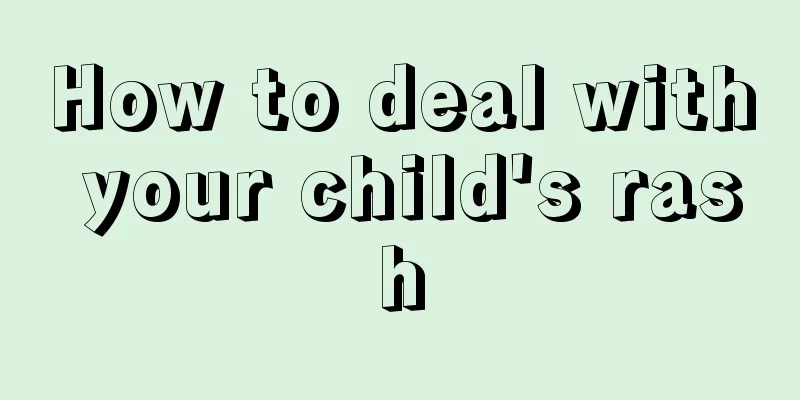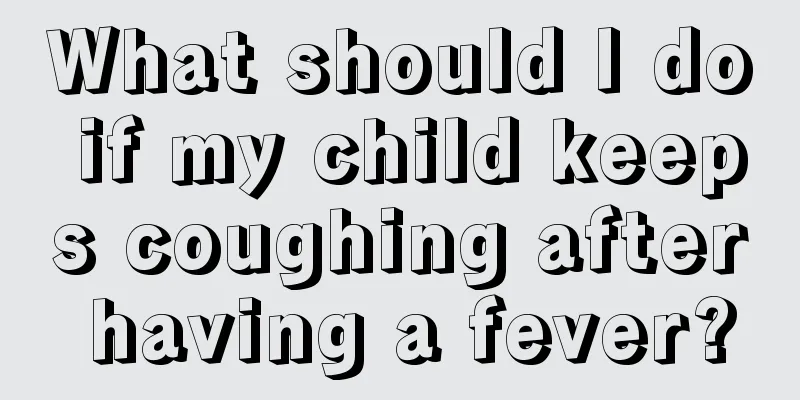How to deal with your child's rash

|
We often hear that children have rashes, commonly known as fever rash, and also called roseola in the southern region. In fact, it is called an emergency in medicine. It is generally believed to be caused by viral infection. It often occurs before the age of 2 in children. The incubation period is about two weeks. It is more common in autumn, spring and other seasons. The following mainly introduces what will happen when a child has a rash and what details of care need to be paid attention to. 1. Symptoms: The baby first has a high fever that lasts for 3 to 4 days, with a body temperature between 39 and 40 degrees. After the fever subsides, a rash quickly appears all over the body, and the rash disappears quickly, without desquamation or pigmentation. These babies also have fever before the rash appears, and the fever can be quite high, but the symptoms of a cold are not obvious. Their spirits and appetite are still good. Their throats may be a little red, and the lymph nodes in the neck and occipital region can be felt but are not tender. There are no other symptoms or physical signs. When the body temperature is about to subside or has already subsided and a rose-red rash appears all over the body, people suddenly realize that the roseola infantum is almost over. Roseola infantum has no effect on the baby's health, and once it occurs, the baby will be immune for life. 2. Care details: 1. Let the child rest. The ward should be quiet, the air should be fresh, and the quilt should not be too thick or too much. 2. Keep the skin clean and hygienic, and wipe off the sweat on the child's body frequently to prevent the child from catching a cold; 3. Let your child drink more boiled water or fruit juice to facilitate sweating and urination, and promote the excretion of toxins. Eat a liquid or semi-liquid diet; 4. When the body temperature exceeds 39 degrees, you can use warm water or 37% alcohol to wipe the child's body to prevent the child from having convulsions due to high fever; Through the above introduction, when children show the symptoms mentioned above, there is no need to worry too much. Generally, the rash will disappear after the fever subsides. Although it is contagious to a certain extent, it is not strong. Generally, adults will not be affected. There will be no major problems for the health of the child after recovery, and the child will have lifelong immunity. The key is to do the care details mentioned above well, then it will be easy to deal with this problem. |
<<: Causes of brain maldevelopment in children
>>: Methods of testing children's mental retardation
Recommend
What should we pay attention to in children's bone development?
Children should not be neglected during the criti...
Is yellowing of the whites of a newborn's eyes jaundice?
After going through the difficult ten months of p...
What is the best age for children to have their teeth corrected?
Teeth are a very important organ for the human bo...
Causes of cold in four-month-old babies
In fact, babies need careful care in all aspects ...
Babies under one month old sleep less
Generally, newborn babies spend most of their tim...
Reasons why children do not gain weight
Most babies weigh between 5 and 7 kilograms after...
Children with severe hair loss
Children are experiencing severe hair loss. We sh...
At what age is it best for children to start brushing their teeth?
Everyone wants to have white teeth, so have you b...
Red spots under the skin of the child's palm
Children are particularly prone to skin diseases ...
Children's cold and stuffy nose
Nasal congestion is a very uncomfortable phenomen...
How to improve children's memory?
Every parent wants their children to be successfu...
Baby's head sweats a lot but not on the body
The baby's physical health will be affected b...
What kind of fish is good for children?
Children usually like to eat fish, but we all kno...
What to do if your three-month-old baby has indigestion
When babies have indigestion, it usually shows in...
What causes breast development in boys?
Do you know about the problem of male breast deve...









